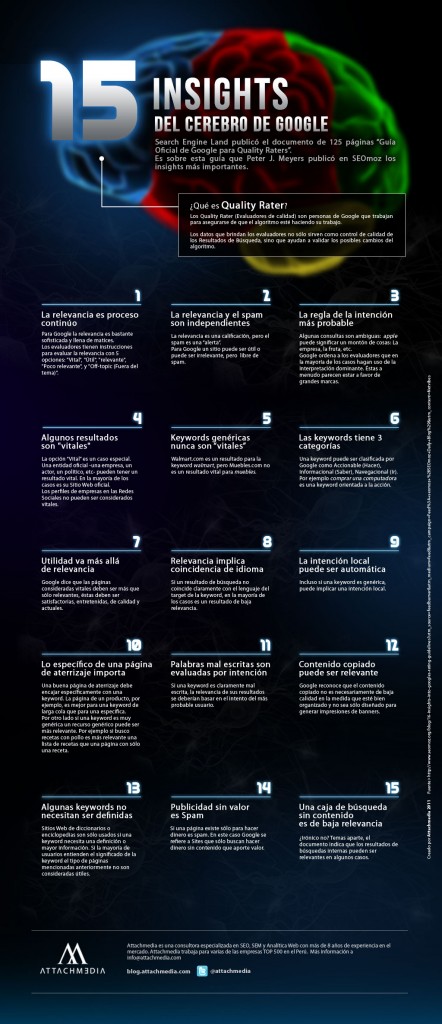 Evaluaciones de Google para el Posicionamiento SEO
Evaluaciones de Google para el Posicionamiento SEO
La infografía que aparece al final de esta entrada sobre el posicionamiento web pertenece al documento “Guía Oficial de Google para Quality Raters”. Los Quality Raters son evaluadores de calidad, trabajadores de Google que se aseguran que el algoritmo sea correcto. La importancia de entender qué considera importante Google al analizar las webs reside en que si sabemos lo que le gusta a Google podemos mejorar nuestras técnicas SEO y posicionamiento web de nuestros sitios online.
A continuación analizamos los 15 elementos que Google tiene en cuenta:
1. La relevancia es un proceso continuo
Los evaluadores analizan el algoritmo y lo valoran a través de 5 aspectos: si es vital, si es útil, si es relevante o no y si está fuera del tema. De esto podemos extraer la conclusión que debemos cuidar las características anteriores en nuestros sitios web, haciendo que la información sea de utilidad y veraz para el usuario. También vemos que un blog de una temática específica es más relevante que no uno que trate temas diversos.
2. La relevancia y el spam son independientes
Para Google un sitio puede ser útil o no, pero siempre libre de spam. A nadie le gusta el spam y eso lo sabe Google, es por eso que prefiere antes las webs o blogs irrelevantes que no los sitios plagados de spam. Por lo tanto: no a los sitios con spam ya que son odiados por los usuarios y por los buscadores.
3. La regla de la intención más probable
Los primeros resultados que aparecen en los motores de búsqueda son los más consultados (de ahí la importancia de aparecer el primero en Google), por ello se deben potenciar las palabras clave específicas de nuestro sitio en la red.
4. Algunos resultados son “vitales”
En estos últimos meses este apartado hay ido cambiando ya que los perfiles en las redes sociales tienen cada vez más peso. La comunidad digital pasa mucho tiempo en las redes sociales como Facebook y Twitter y desea mantenerse informado sobre aquello que le interesa de una manera cómoda, que no tenga que ir a buscarla constantemente y por ello “sigue” los perfiles o páginas que le gustan. Conclusión: si tienes una empresa además de tener una web debes estar presente en las redes sociales para interactuar constantemente con tus clientes.
5. Keywords (palabras clave) genéricas no son “vitales”
Aunque las palabras genéricas no son vitales sí deben aparecer con insistencia en tu sitio aunque como hemos dicho antes lo que hay que potenciar son aquellas keywords específicas que definen aún más a tu empresa o negocio y crear contenido de calidad que sea bien valorado por Google.
6. Las keywords tienen 3 categorías
Google suele clasificar las palabras clave en:
Accionable (hacer)
Informativa (saber)
Navegacional (ir)
Es esencial explotar este recurso y si por ejemplo queremos transmitir una información al usuario (saber) debemos escribir palabras que le indiquen a Google que es un artículo “saber”, palabras como: qué es, cómo, datos, consejos etc.
7. La utilidad va más allá de la relevancia
Una página ideal es aquella que es relevante, satisfactoria, entretenida, de calidad y actual. Estas características son las más valoradas por los usuarios que son los que deben quedar satisfechos con nuestros servicios.
8. Relevancia implica conciencia de idioma
Si un resultado de búsqueda no coincide con el lenguaje de la palabra clave es un resultado de baja relevancia. Cuando tenemos una web de más de un idioma hay que adaptar las palabras clave al idioma, por ejemplo en español es probable que en vez de buscar el término “keywords” el usuario busque “palabras clave”.
9. Intención local puede ser automática
Las búsquedas locales pueden aparecer entre los primeros resultados de Google, por esa razón las pequeñas empresas utilizan herramientas de geolocalización como GoogleMaps para indicar su dirección a los usuarios.
10. Lo específico de una página de aterrizaje importa
Es simple, las palabras específicas tienen menos números de búsqueda pero a la vez tienen menos competencia que una web genérica. Hay que potenciar aquello que nos hace únicos, ya sea por nuestros productos, por nuestra localización (ejemplo: carpintería de tal pueblo) etc. Hay que combinar palabras génericas y específicas.
11. Palabras mal escritas son evaluadas por intención
Si un término o palabras está mal escrito cuando un usuario lo busca en Google se aplica la norma de la intención más probable, es decir que se deduce que es lo que quería escribir.
12. El contenido copiado puede ser relevante
Google no considera que el contenido copiado sea de baja calidad pero debe ir siempre acompañado de la acreditación a la fuente (decir al final del texto/imagen/video… quién es el autor del contenido y enlazarlo a su página web). Si alguien copia nuestro contenido pero nos acredita como autores puede hacer crecer nuestro posicionamiento.
13. Algunas palabras clave no necesitan ser definidas
No debes explicar todos los términos a los usuarios como si fueran tontos porque no lo son. En el caso de que creas que una palabra requiere de una mayor explicación puedes hacer un enlace a otra página tuya o externa que defina la palabra para que el usuario que no la entienda pueda informarse y el que ya la conozca no tenga que leerse una parrafada innecesaria.
14. Publicidad sin valor es spam
Google considera que aquellas páginas web que están enfocadas exclusivamente a hacer dinero sin aportar contenido de calidad para el usuario son spam. Está bien que quieras que tu negocio sea rentable pero para ello debes cuidar a tu cliente y satisfacerlo no solo decirle: “¡cómprame, cómprame, cómprame!”
15. Una caja de búsqueda sin contenido es de baja calidad
Si la web, blog o perfil social carece de contenido una caja de búsqueda no tiene valor. Aquellas con un buen contenido y rigor informativo son siempre las mejor consideradas por Google.
¿Tienes alguna duda o quieres comentar algo al respecto? ¡Puedes escribir tu comentario!


